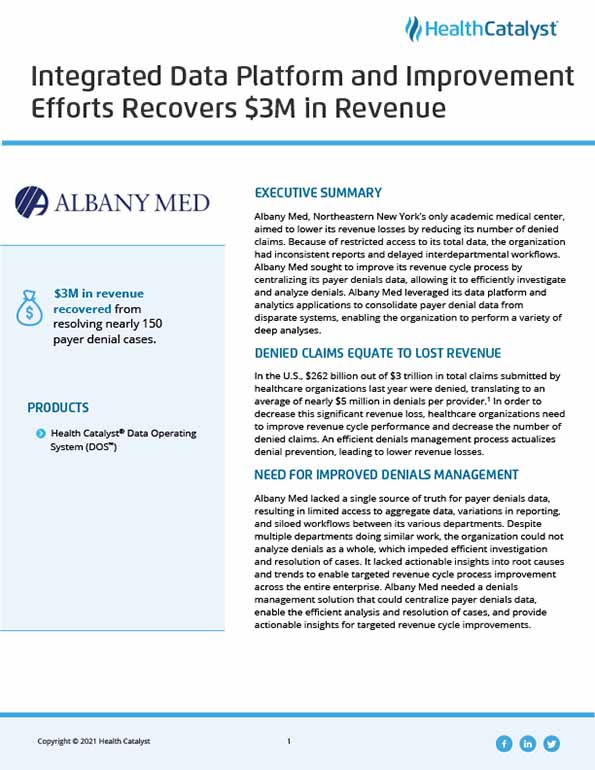Albany Med, Northeastern New York’s only academic medical center, aimed to lower its revenue losses by reducing its number of denied claims. Because of restricted access to its total data, the organization had inconsistent reports and delayed interdepartmental workflows. Albany Med sought to improve its revenue cycle process by centralizing its payer denials data, allowing it to efficiently investigate and analyze denials. Albany Med leveraged its data platform and analytics applications to consolidate payer denial data from disparate systems, enabling the organization to perform a variety of deep analyses.
In the U.S., $262 billion out of $3 trillion in total claims submitted by healthcare organizations last year were denied, translating to an average of nearly $5 million in denials per provider.1 In order to decrease this significant revenue loss, healthcare organizations need to improve revenue cycle performance and decrease the number of denied claims. An efficient denials management process actualizes denial prevention, leading to lower revenue losses.
Albany Med lacked a single source of truth for payer denials data, resulting in limited access to aggregate data, variations in reporting, and siloed workflows between its various departments. Despite multiple departments doing similar work, the organization could not analyze denials as a whole, which impeded efficient investigation and resolution of cases. It lacked actionable insights into root causes and trends to enable targeted revenue cycle process improvement across the entire enterprise. Albany Med needed a denials management solution that could centralize payer denials data, enable the efficient analysis and resolution of cases, and provide actionable insights for targeted revenue cycle improvements.
Albany Med leveraged the Health Catalyst® Data Operating System (DOS™) platform and a robust suite of analytics applications to centralize payer denial data from multiple disparate systems, including case management, patient billing, and physician practice data at both the hospital visit and practice service levels. The improved denials management process established a single source of truth, surfacing years of data from which to conduct a wide variety of deep analyses.
Albany Med developed a revenue cycle analytics application that allows the organization to recognize high-level trends and drill into the data to conduct deep-dive analyses of denials data, identifying opportunities for improvement. It also established a multidisciplinary improvement team to assume responsibility for managing and administering its newly developed capabilities.
For the first time, Albany Med can now visualize and analyze numerous data of interest to stakeholders that impact denials performance, including clinical documentation, utilization, case management, hospital ancillary services (e.g., lab, imaging, and dialysis), physician practice, and patient billing services. It can also determine the root causes of denials, evaluate denials management performance, and identify trends. In addition to quickly and easily viewing denials data by type, department, and provider, Albany Med can also view denials data by payer, enabling it to visualize the denial rate per payer and the top diagnoses denied by payer. Additionally, the organization can identify the reason for the denial and the impact of the denial appeal on payment.
The improvement team facilitates organizational improvement, ensuring the organization provides the most appropriate interventions to improve performance, such as provider education, process changes, and improved payer communication. For example, Albany Med was denied payment for a patient undergoing a transplant who had an eight-day length of stay (LOS). The denial indicated that the payer had not received the medical records required for the claim. Using the analytics application, the organization determined that medical records data had only been sent for six of the patient’s eight- day stay, but medical records for the weekend—when the patient was discharged—had not been sent.
Previously, the organization would have been unable to quickly identify the reason for the denial, and the claim would have been denied for the entire stay. In this case, the organization was able to appeal the denial, clarify which medical records had been provided, send the remaining records, and receive complete payment for the entire LOS. It also adjusted processes for weekend discharges, ensuring the appropriate medical records are sent to the payer, preventing future denials.
Albany Med’s data-informed denials improvement has achieved the desired results. In just one year, the organization has recovered:
"Albany Med leveraged the Health Catalyst® Data Operating System to establish a single source of truth for payer denials data and improve revenue cycle processes, resulting in the recovery of $3M in revenue."
- Holly Fetter, MS, Healthcare Data Scientist, Albany Med
Albany Med continues to utilize its data platform and revenue cycle analytics application to identify and resolve high-value denials and drive continual revenue cycle performance improvement.


